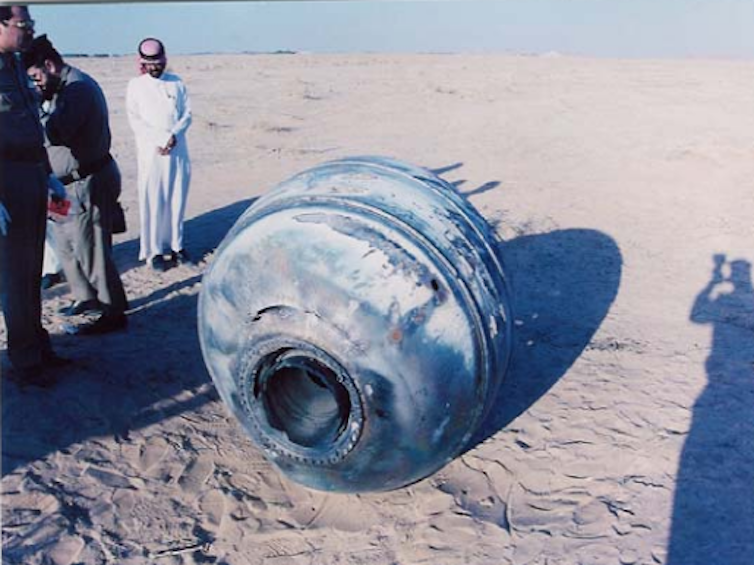[ad_1]
The prospect of somebody being killed by house junk falling from the sky could appear ridiculously tiny. In any case, no person has but died from such an accident, although there have been cases of damage and injury to property. However on condition that we’re launching an growing variety of satellites, rockets and probes into house, do we have to begin taking the chance extra significantly?
A brand new examine, printed in Nature Astronomy, has estimated the prospect of causalities from falling rocket components over the following ten years.
Each minute of daily, particles rains down on us from house – a hazard we’re virtually utterly unaware of. The microscopic particles from asteroids and comets patter down by means of the ambiance to settle unnoticed on the Earth’s floor – including as much as round 40,000 tonnes of mud every year.
Whereas this isn’t an issue for us, such particles can do injury to spacecraft – as was not too long ago reported for the James Webb house telescope. Sometimes, a bigger pattern arrives as a meteorite, and possibly as soon as each 100 years or so, a physique tens of metres throughout manages to drive by means of the ambiance to excavate a crater.
And – thankfully very not often – kilometre-sized objects could make it to the floor, inflicting demise and destruction – as proven by the dearth of dinosaurs roaming the Earth right this moment. These are examples of pure house particles, the uncontrolled arrival of which is unpredictable and unfold roughly evenly throughout the globe.
The brand new examine, nonetheless, investigated the uncontrolled arrival of synthetic house particles, reminiscent of spent rocket levels, related to rocket launches and satellites. Utilizing mathematical modelling of the inclinations and orbits of rocket components in house and inhabitants density beneath them, in addition to 30 years’ value of previous satellite tv for pc knowledge, the authors estimated the place rocket particles and different items of house junk land after they fall again to Earth.
They discovered that there’s a small, however vital, danger of components re-entering within the coming decade. However that is extra prone to occur over southern latitudes than northern ones. In actual fact, the examine estimated that rocket our bodies are roughly thrice extra prone to land on the latitudes of Jakarta in Indonesia, Dhaka in Bangladesh or Lagos in Nigeria than these of New York within the US, Beijing in China or Moscow in Russia.
The authors additionally calculated a “casualty expectation” — the chance to human life — over the following decade because of uncontrolled rocket re-entries. Assuming that every re-entry spreads deadly particles over an space of ten sq. metres, they discovered that there’s a 10% likelihood of a number of casualties over the following decade, on common.
Thus far, the potential for particles from satellites and rockets to trigger hurt on the Earth’s floor (or within the ambiance to air site visitors) has been thought to be negligible. Most research of such house particles have centered on the chance generated in orbit by defunct satellites which could hinder the protected operation of functioning satellites. Unused gas and batteries additionally result in explosions in orbit which generate further waste.
However because the variety of entries into the rocket launch enterprise will increase – and strikes from authorities to personal enterprise – it’s extremely possible that the variety of accidents, each in house and on Earth, reminiscent of that which adopted the launch of the Chinese language Lengthy March 5b, may even enhance. The brand new examine warns that the ten% determine is subsequently a conservative estimate.
What may be completed
There are a selection of applied sciences that make it solely attainable to regulate the re-entry of particles, however they’re costly to implement. For instance, spacecraft may be “passivated”, whereby unused power (reminiscent of gas or batteries) is expended fairly than saved as soon as the lifetime of the spacecraft has ended.
The selection of orbit for a satellite tv for pc can even cut back the prospect of manufacturing particles. A defunct satellite tv for pc may be programmed to maneuver into low Earth orbit, the place it should expend.

wikipedia
There are additionally makes an attempt to launch re-usable rockets which, for instance, SpaceX has demonstrated and Blue Origin is creating. These create lots much less particles, although there will probably be some from paint and steel shavings, as they return to Earth in a managed means.
Many businesses do take the dangers significantly. The European Area Company is planning a mission to try the seize and elimination of house particles with a four-armed robotic. The UN, by means of its Workplace of Outer Area Affairs, issued a set of Area Particles Mitigation Pointers in 2010, which was strengthened in 2018. Nonetheless, because the authors behind the brand new examine level out, these are pointers, not worldwide legislation, and don’t give specifics as to how mitigation actions must be applied or managed.
The examine argues that advancing applied sciences and extra considerate mission design would scale back the speed of uncontrolled re-entry of spacecraft particles, lowering the hazard danger throughout the globe. It states that “uncontrolled rocket physique reentries represent a collective motion drawback; options exist, however each launching state should undertake them.”
A requirement for governments to behave collectively just isn’t unprecedented, as proven by the settlement to ban ozone layer-destroying chlorofluorcarbon chemical substances. However, fairly sadly, this type of motion normally requires a significant occasion with vital penalties for the northern hemisphere earlier than motion is taken. And modifications to worldwide protocols and conventions take time.
In 5 years, it is going to be 70 years because the launch of the primary satellite tv for pc into house. It could be a becoming celebration of that occasion if it could possibly be marked by a strengthened and necessary worldwide treaty on house particles, ratified by all UN states. Finally, all nations would profit from such an settlement.
[ad_2]
Source link


